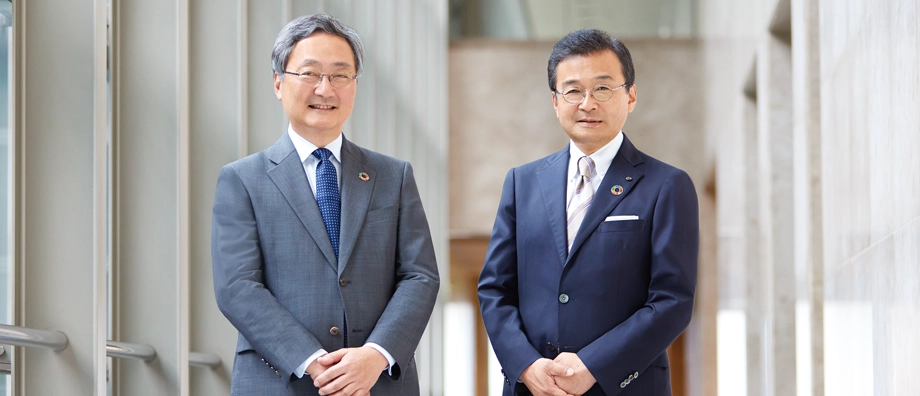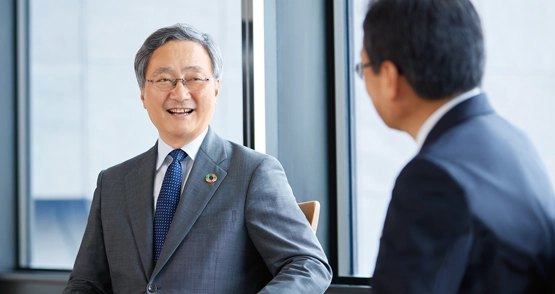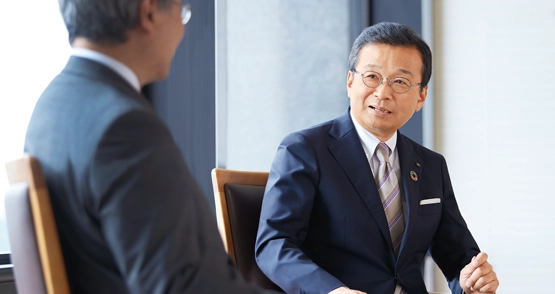CAO DIALOGUE
“RONGO (Ethics) and SOROBAN (Economy)” and “Sampo-yoshi”
Mr. Ken Shibusawa and CAO Kobayashi talked about visualizing the “non-visible value” of companies and the way sustainability runs through the past, present, and future.

Ken Shibusawa
CEO, Shibusawa and Company, Inc.
After gaining extensive market experience at foreign financial institutions and hedge funds over many years, Ken Shibusawa set out on his own in 2001 to found Shibusawa and Company, Inc., where he assumed the role of CEO. In 2007, he founded Commons, Inc., which was subsequently renamed Commons Asset Management, Inc. in 2008, and took on the position of Chair. In January 2023, he founded &Capital Inc., where he currently is Representative Director & CEO. Furthermore, he is active in a wide variety of roles, including his positions as member of various government panels such as the Council of New Form of Capitalism Realization. He is also the great-great-grandson of Eiichi Shibusawa, who is widely known as “the father of Japanese capitalism.”
Fumihiko Kobayashi
Member of the Board, Executive Vice President, CAO*
* Chief Administrative Officer
A Sense of Mission Shared by Entrepreneurs Who Lived in the Same Era
Kobayashi:ITOCHU is proud of our 165 year history of sustained operations since our founding in 1858, when Chubei Itoh I commenced linen trading operations. Counting from when he opened the first store called “Benchu” in Osaka’s Honmachi area in 1872, 2022 marked the 150th anniversary of our Company. Notably, that was also around the same time that Eiichi Shibusawa, regarded as “the father of Japanese capitalism,” resigned from the Ministry of Finance, entered the business world, and launched his own business. Shibusawa’s book, “RONGO (Ethics) and SOROBAN (Economy),” details a management philosophy that explains how businesses are destined to fail if the balance between profits and morality is not achieved. Chubei Itoh I also adhered to the philosophy that trade is a “compassionate business,” and that a business will fail if it does not equally benefit the seller, the buyer, and society—also commonly known in Japan as the philosophy called “Sampo-yoshi.” I think these two men had a lot in common regarding their business policies and philosophies.
Shibusawa:Yes, indeed. Firstly, the Shibusawas were originally farmers of indigo and silkworms, so they were involved in the textile business and shared that in common with the Itohs. As Japan’s modernization progressed amid the drastic changes of the era, both men broadened their perspectives beyond their family businesses to embrace a common sense of duty to help enrich the world through business. I also believe that they worried about society’s divergence away from the “bushido” philosophy and morality, and embracing a philosophy focused solely on putting profits first.
Kobayashi:Turning now to the modern era, Japanese companies have been adopting concepts and systems based on European and American shareholder capitalism. To date, they mainly undertake management with maximizing shareholder returns as its mission. Now, however, in line with the idea that the pursuit of shareholder profit alone cannot guarantee the sustainability of companies, “stakeholder capitalism” is being increasingly emphasized, starting with Europe and the United States. This revives the spirit and sense of mission that our two founding fathers held close to their hearts, and their mission of enriching the world through business. With a universality transcending both eras and borders, their vision is making a comeback.
Shibusawa:To avoid simply replicating superficial imitations of European and American concepts, and also to uphold our own traditional Japanese spirit, Eiichi Shibusawa professed that we should value not just the “How,” but also the “Why.” Companies will not exist in perpetuity if they only have good management processes and methods. I believe that the “power of human” is the source of a company’s sustainability. ITOCHU has now grown to become a huge company, despite its humble beginnings as a small startup when it was founded. Over the long course of over 160 years since its founding, I believe ITOCHU has been able to sustain its operations by maintaining a trailblazing spirit throughout each new era, and also by endeavoring to meet the diverse and changing needs.
Sustainability Unique to General Trading Companies
Kobayashi:In the pursuit of progress with our sustainability going forward, we remain well aware of the need to avoid merely continuing to do the same things as in the past in order to ensure the sustainability of our Company. I would be very grateful if you could offer your advice and guidance related to ITOCHU’s vision and the direction in which our Company should head.
Shibusawa:When we talk about sustainability, companies and stakeholders need a “common language.” General trading companies operate a wide range of businesses across diverse industries, with varying positions in the business flow process ranging from upstream to downstream. Also, the businesses of trading companies are intricately woven into people’s day-to-day lives. Consequently, there has been an organic increase in the external demands and expectations which general trading companies need to consider. Accordingly, there are many sustainability issues that need to be addressed, and I am sure ITOCHU receives various guidance on them. But I think what ITOCHU needs to avoid is just passively responding to this multitude of issues. Instead, ITOCHU should proactively advocate its core philosophies that have enabled it to establish a strong track record of sustainability reflected in its over 160 years of operations. For example, the differing positions on and status of GHG emissions reductions in each country make it a difficult course to navigate. And while developed countries aim to withdraw from fossil fuel burning activities, emerging and developing countries will still need coal and other inexpensive sources of fuel for their ongoing development. I think it is somewhat unrealistic to expect these countries to avoid the use of any fossil fuels, but I expect ITOCHU to work on resolving issues in various countries by providing new technologies and solutions cultivated from its involvement in a diverse range of businesses.
Kobayashi:In accordance with our medium-term management plan, ITOCHU has laid out “Enhancing our contribution to and engagement with the SDGs through business activities” as one of our basic policies. Our Company was the only one among the general trading companies to have disclosed information on GHG emissions from all of its related fossil fuel businesses and interests. Moreover, we formulated targets that newly include the concept of “offsets” in the context of GHG emissions reduction. By FYE 2022, we sold three of four thermal coal interests that we held in FYE 2019 as part of our efforts to reduce GHG emissions from fossil fuel businesses and interests. Our Company aims to achieve the Japanese Government’s “2050 Carbon Neutral” goal 10 years ahead of schedule, in 2040, by leveraging business expansion in areas such as renewable energy to help offset and reduce our Company’s own GHG emissions. However, I feel that Scope3 emissions disclosure poses a major challenge for ITOCHU because it operates businesses with a huge number of companies across supply chains in a wide range of business fields.
(→ Approach to Climate Change and Related Initiatives)![]()
Shibusawa:This appears to be an issue that is unique to general trading companies. When I have conversations with overseas experts, it is assumed to disclose estimates; however, people in Japan worry about how accurately they can disclose GHG emissions from the upstream to the downstream. The criteria for Scope3 emissions disclosure is still being discussed overseas as well, so for example by conducting flexible initiatives such as proactively identifying the range of Scope3 emissions to be disclosed based on the characteristics of its businesses and demonstrating the relationship with financial information, I think ITOCHU could become a leading model for companies facing similar issues.
Kobayashi:Thank you for your sound advice. We have spent considerable time discussing our mission of “achieving the SDGs,” including decarbonization, and consider this a crucial social responsibility in which we need to not only deal with immediate issues but also educate and raise awareness among the next generation. In keeping with this responsibility, we established the ITOCHU SDGs STUDIO next to our Tokyo Headquarters as a base to disseminate information about the SDGs. The studio also features a facility where children can learn through play about SDGs concepts and their connections to society. We are happy to be able to report that many people are making use of this facility.
(→ New Facilities Opened at the ITOCHU SDGs STUDIO)
Shibusawa:To contribute to the sustainability of society, educating children, who will be responsible for determining the future, is an important mission for companies.

Human Capital as a Source of “Non-Visible Value”
Kobayashi:From FYE 2023, it has become mandatory to disclose more extensive human capital-related disclosure in annual securities reports, but at the same time freedom over voluntary disclosure has also increased in certain aspects. ITOCHU’s score on the engagement survey conducted in FYE 2022 was high compared to the average Japanese company, but was slightly lower than our score recorded in FYE 2019. In particular, scores of junior employees have been on a downward trend, and our analysis has found certain key issues such as the desire for more flexible work styles, adverse effects of vertical organizational silos, and limitations of existing educational and training programs that require special attention. We disclose the results of our analysis both internally and externally, and we need to develop specific countermeasures to help resolve these key issues. Consequently, we sought first to realize more flexible work styles. In full consideration of the front lines of our work where we interact with our customers, we introduced the Morning-Focused Flextime System, which combines the flextime system with ITOCHU’s hallmark Morning-Focused Working System. We also expanded the work from home system to all employees. With regards to the issue of vertical organizational silos, which seems to be a common characteristic of all general trading companies, we are working to steadily eliminate these silos by introducing systems where employees can transfer more flexibly between Division Companies, as well as implementing the new Virtual Office system, which enables employees to hold dual jobs within ITOCHU. Frankly, we were unsure if we should disclose the issues identified in the engagement survey. However, by also disclosing our suite of countermeasures and clearly showing ITOCHU’s commitment to making improvements, we were able to garner acclaim from outside our Company as well as from our employees. In addition, the Company has set labor productivity as an indicator to measure the effectiveness of our human resource investments. And because ITOCHU has fewer employees compared to our competitors, we need to increase the labor productivity of each of our employees, whom collectively comprise our greatest management resource, in order to continue to enhance our corporate value. To this end, we have taken a variety of measures, such as reducing the number of meetings and documents to improve productivity and introducing our Morning-Focused Working System to enhance efficiency. Consequently, labor productivity in FYE 2023 improved by approximately five times when compared with FYE 2011.
Shibusawa:Five times is astounding! Corporate disclosure can be an effective tool for a dialogue to communicate policies, directions, and other important information to stakeholders. As an investor, we are interested not in what a company is accomplishing today, but rather where it is heading and what challenges the company is taking on, especially demonstrated quantitatively, to become able to do what it cannot do today. Showing ambition toward achieving its goals, together with a concrete roadmap will be a favorable tool for future corporate value creation. I think there is a limit to the “Showa-style” employment structure of lifetime employment, seniority-based promotions, and mass hiring of new graduates. While large companies tend to focus on lowering their voluntary resignation rate, I do not think that is always the right mentality. The “New Form of Capitalism” announced by the current Japanese Government cites the objective of smoothing mobility in the labor market. I believe Japan’s labor market can grow significantly by realizing conditions that allow personnel to seamlessly transfer between companies. For example, a virtuous cycle could be created where ITOCHU’s corporate value increases further when employees bearing ITOCHU’s DNA leave the Company and then either return to the Company later with new skills and knowledge acquired from their time spent outside, or even if they do not return to the Company they instead directly contribute to society using their skills and knowledge acquired as an ITOCHU alumnus. Based on this train of thought, I believe it would be interesting for ITOCHU to establish an indicator using not just the employee resignation rate, but also the re-employment rate. Japanese companies still lack diversity in terms of gender, nationality, and seniority. Many companies are increasing the number of female outside directors, but because ITOCHU has a large number of excellent and talented personnel in-house, the Company should also increase the number of females assigned to executive officer-level positions.
Kobayashi:As you suggest, using the re-employment rate as an indicator seems to be a novel approach. As you also pointed out, ITOCHU considers the promotion of women’s advancement as an important management priority. In FYE 2022, the Company established the Women’s Advancement Committee as an advisory committee to the Board of Directors, and it has begun full-scale efforts to develop measures to promote women. However, the majority of career-track female employees are still in their 20s and 30s, which is a little inexperienced to become a manager and not something that can be easily remedied. We are not just setting quantitative targets, but are also steadily promoting measures to support the advancement of women while listening to the opinions of our female employees. Because we enable employees to tap into their full potential, health management is the most important concern for our Company. We established the ITOCHU Health Charter in FYE 2017 and have fostered an environment where employees can work with peace of mind. With regards to our operations related to employee health, we employ a total of around 50 medical professionals, including three full-time doctors. Thanks to this internalized medical function, we provided comprehensive support day and night, 365 days a year during the pandemic, and were able to prevent the outbreak of any cluster infections in the office or severe cases. And in recognition of our medical staffs’ efforts throughout the pandemic, we presented special employee awards to the medical personnel just the other day.
Shibusawa:As you said, I think employees can only create value when they are first able to work without any concerns for their health. Personnel costs, benefits, and other similar expenses can be considered a long-term investment. And yet under current financial accounting, they are ultimately recognized as costs, and positioned as factors that reduce corporate value. Thinking about it another way, the value of people is not quantifiable financially; they have “non-visible value” and can be considered as an expected value that can be realized in the future. Looking at it from a capital markets perspective, a price-to-book ratio (PBR) of 1 time indicates a state where “visible value = market expectations,” completely absent of any “non-visible value.” The point where PBR exceeds 1 time marks the point at which “non-visible value = people” first appears in this valuation indicator, and reflects future growth expectations. ITOCHU has focused on human capital from early on and has achieved the highest PBR of all the general trading companies. I think this shows how there is a positive correlation between human capital and PBR.
Kobayashi:Thank you. I am extremely glad that ITOCHU’s “non-visible value” is being lauded by the market.

Promoting “Sampo-yoshi” around the World and into the Future
Shibusawa:Let’s expand our perspective to include the world of investment, and also consider the “New Form of Capitalism” philosophy put forth by the Japanese Government. In addition to the two conventional dimensions of “risk” and “return,” we will continue incorporating the concept of “impact investing” to visualize a third dimension of positive and negative impacts on the environment and society from the perspective of corporate management. ITOCHU’s “Sampo-yoshi” corporate mission is not just about doing “good,” and interesting if you could figure out a way to measure the “good” done. Although I think the value as a seller can be visualized to some extent, if it is somehow possible to visualize the impact of the value to the buyers and society, then it would also be possible to show the impact to society. And this could become a “common language” unlike any other in the world.
Kobayashi:When vaccines were being provided at workplaces during the COVID-19 pandemic, ITOCHU continually disclosed daily reports of its own vaccination program so that other vaccination centers might benefit from this information. Our Company also discloses all content related to our many unique initiatives and human resource measures. These activities have had a major impact in some cases on a wide segment of Japanese society, and may be referred to as ITOCHU’s unique “impact.” Just as I have received many clues through today’s dialogue with you, I have found a renewed awareness of our ability to enrich the world through our businesses. And we will remain committed to practicing our unwavering philosophy of “Sampo-yoshi” and strive to further enhance ITOCHU’s sustainability. Thank you for your time today.
